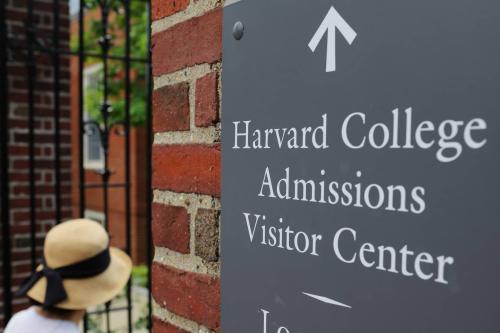The college admissions bribery scandal revealed serious moral failings of its participants and has sparked a much-needed appraisal of admissions practices at elite institutions. But the scheme should also prompt a review of how the ringleader was able to operate at a large, fraudulent charitable organization unchecked for at least 6 years. The whole scheme should have been uncovered and stopped earlier—and would have been— had tax authorities done even a cursory review of the purported charity’s activities, which are clearly detailed in publicly-available tax filings. The IRS should step up review of tax-exempt organizations and Congress should rebuff recent proposals that would free charities from reporting, confidentially, the sources of their funds.
A key criminal element of the conspiracy was the use of a charitable organization to funnel and launder the bribes. The “Key Worldwide Foundation” operated since at least 2013, according to IRS filings which are available to the general public online, and received more than $7 million in “charitable” contributions between 2013 and 2016. Those documents reveal a surprising amount of suspicious activity.
In each of the three years of tax filings available online, Key Worldwide lists Gordan Ernst—the Georgetown tennis coach—as a consultant, his home address, and how much he was paid ($825,000 in 2016.) The return also lists all the bribes paid to the athletic departments at each of the postsecondary institutions. In addition to the eight schools named in the criminal complaint, the documents list several other institutions. Let’s hope they are now looking into their admissions and athletic department practices.
Ironically, Key Worldwide lists its mission as “to provide education that would normally be unattainable to underprivileged students.” A few simple questions like “how did paying the Georgetown Tennis coach $825,000 advance your charitable goal?” or “how did the $252,000 gift to the UT athletics department help provide an education for underprivileged students?” or “what motivates your donors?” would have gone a long way to unraveling this case.
Neither Key Worldwide nor its founder Rick Singer were ever asked such questions. The scandal came to light only because of a tip from an individual seeking clemency for an unrelated securities crime. Absent that random tip, we’d still be in the dark.
But it’s no surprise Key Worldwide was never examined despite being among the larger public charities, measured by donations. In 2017, the IRS examined the books of only 6,101 tax exempt organizations. To put that in perspective, there are roughly a million public charities and 1.4 million tax exempt organizations. Most are so small they send in only a postcard. Key Worldwide was certainly not the largest charity, but only about 7 percent of all public charities receive more than $1m in donations in any given year. And some charities, like churches, aren’t even required to file any tax return and are almost never examined.
I’m not advocating that we subject charities to adversarial or onerous audits. But the IRS or even the public entities should review more returns, flag unusual cases, and ask more institutions about their work and their relationships. Charities file returns for a reason, and those returns are made public so that they can be scrutinized more easily. That would be much easier if tax-exempt organizations filed electronically. While abuse is rare, those rare cases can be egregious, as in the case of the college cheating scandal, and costly. Purported charitable contributions for donations of conservation easements, for example, may cost taxpayers billions of dollars each year. In this case, the $7 million in fraudulent donations to Key Worldwide might have subsidized the bribes of parents by as much as $3 million.
Furthermore, we should make sure that tax exempt organizations continue to report the information necessary to enforce the law. Now that the case is broken, the Key Worldwide Foundation’s tax return provides essential information for investigators and prosecutors—particularly Schedule B, which provides the list of all substantial donors the charity. In Schedule B enforcement authorities have a list of all the parents who funneled bribes through the charity including, perhaps, individuals not caught on the wire. Unfortunately, bills before Congress propose to scrap Schedule B for all tax exempt entities. Last year, the IRS already scrapped Schedule B for certain tax exempt filers by regulation. The college admissions scandal shows why that’s a mistake.
Most charitable entities are, of course, doing good deeds and are rightly proud of their work. Indeed, when asked about their charitable activities, the charities I interact with light up to talk about their activities and successes, telling stories about advancing conservation, or improving education, or helping disadvantaged communities or individuals. But the college admissions bribery scandal indicates that the IRS has been lax in its reviews. With the IRS unable to properly examine them and Congress working to further reduce transparency around their donors—it’s likely this won’t be the last scandal involving a fraudulent charitable organization. It just may be the last one to get caught.



Commentary
It took 6 years to uncover the college admissions scandal, here’s what the IRS and Congress can do better next time
March 28, 2019